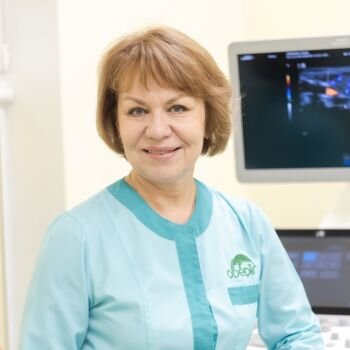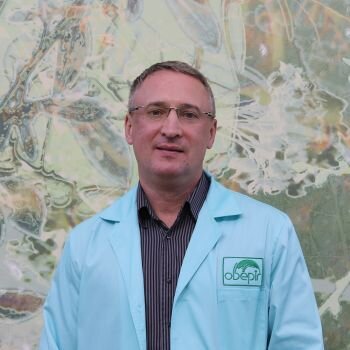Nerves transplantation, reconstructive surgery of nerve plexuses
- Innovative technologies for nerve and plexus reconstruction
- High success rate of interventions
- Coordinated work of a multidisciplinary team
Nerve transplantation, or autotransplantation of peripheral nerves, is a modern method of nerve reconstruction that requires not only the operating surgeon's skill but also the application of innovative technologies. These include, for example, the use of multipotent stromal cells from adipose tissue (MSCs), plasma growth factors, and others.
The essence of a nerve transplantation surgery is to isolate fibers of a healthy nerve and transplant them into the required area without causing functional impairment in the donor site.
At the "Oberig" clinic, nerve autotransplantation surgeries are performed by Andriy Petakh —a plastic surgeon with 25 years of experience and a Candidate of Medical Sciences. He leads the multidisciplinary team of specialists who are capable of achieving positive results in treating peripheral nerve injuries.
When is nerve autotransplantation surgery indicated?
Nerve damage with the loss of motor functions (limb movement, facial expressions) resulting from household injuries, car accidents, and mine-blast or other types of combat-related trauma.
Pre-operative examination for nerve autotransplantation
Clinical and instrumental diagnostics include a physical examination of the patient with a list of general laboratory tests, as well as instrumental examinations (vascular Doppler, angiography, ultrasound), among which nerve ultrasound is of particular importance. Together with a neurologist, an ultrasound specialist, and a vascular surgeon, the plastic surgeon assesses the condition of the damaged nerve, the surrounding tissues, and determines the feasibility of a reconstructive neurosurgical intervention.
Preparation for nerve transplantation surgery
During the preparation for nerve transplantation surgery, the patient must undergo a rehabilitation program aimed at restoring passive movements in the limbs. Only if passive movements in the limb are restored does the nerve autotransplantation surgery have a prognostically higher chance of success. This is because the muscle to which the nerve is to be connected must remain "alive" and functionally viable (i.e., capable of contracting and relaxing). Neurologists and rehabilitation medicine specialists are involved in this stage of preparation.
Results of nerve autotransplantation surgery and recovery timelines
One should not expect immediate results after nerve transplantation surgery—nerve tissue regenerates at a certain rate: on average, a nerve regrows by 1 mm per day, or 3 cm per month. By using a ruler to measure the distance the nerve must regrow, we can estimate the approximate timeline for the limb's function to recover. However, even in the first few days after nerve transplantation surgery, the appearance of some symptoms (e.g., a tingling sensation in and below the surgical area) indicates that nerve regeneration has begun.
 Havryliv Iryna
Havryliv Iryna
- Neurologist of the Stroke Center
- 25 years of medical experience
- PhD in Medical Sciences
- Innovative technologies for nerve and plexus reconstruction
- High success rate of interventions
- Coordinated work of a multidisciplinary team
At the "Oberig" clinic, we have accumulated significant successful experience in performing surgeries on peripheral nerves. However, almost every second intervention is a challenge, as the nature and mechanism of the injuries patients receive today are unique and complex. According to the clinic's operating plastic surgeon, Andriy Petakh, "hopeless situations exist, but not for us — we use even the smallest chance to help a patient regain lost limb functions in cases of peripheral nerve damage."
Additionally, an integral and exclusive advantage of nerve transplantation surgeries at the "Oberig" clinic is the use of innovative technologies involving MSCs and plasma growth factors, which significantly improves the quality of the results obtained.
30.05.2025
Від щирого серця дякую лікарям! Хочу висловити свою щиру подяку лікарям та всьому медичному персоналу за високий професіоналізм, чуйність, турботу та підтримку протягом усього л...
07.03.2025
Уклінно дякую неймовірній лікарці Наталії Володимирівні Рєпіній за професіоналізм та людяність! Знайшовши проблеми ні УЗІ, вона змогла все пояснити, заспокоїти. Вийшла від неї з ка...
10.08.2025
Дяка! Мені пощастило, що я потрапив до Андрія Ласловича, і він зміг зробити те, що здавалось неможливим - відновити плечове сплетіння після поранення. Таких лікарів на світі - один...
23.09.2024
Дякуємо лікарю УЗД Репіній Наталії Володимирівні за професійність та чуйне ставлення до пацієнта. Вчора звернулися на комплексне УЗД черевної порожнини та органів малого тазу, отри...
31.05.2025
Щиро дякую лікарю-професіоналу з великої букви Андрію Ласловичу! Врятував мені єдину вцілілу руку, хоча в госпіталі казали, що "діла не буде". Разом з неврологом Іриною Романівною...
25.11.2020
Щиро вдячна Ірині Романівні за професіоналізм та швидко виставлений діагноз. Ніяких зайвих обстежень, динамічне залучення необхідних фахівців для уточнення діагнозу. Дуже приємно в...
10.10.2020
Дуже уважний лікар. Моє хвилювання, як рукою зняло, коли почали спілкуватися з лікарем. Обов'язково при наступних профілактичних УЗД обстеженнях буду звертатися до Наталі Володимир...
30.01.2019
Чудовий лікар! Була у неї на обстеженні декілька разів і завжди мала лише позитивні враження. Приємна у спілкуванні, дуже уважна, спокійна. На планові УЗД намагаюся потрапити лише ...
16.10.2018
Знаємо Наталію Володимирівну вже майже 17 років. 17 років тому Н.В. єдина нам поставила правильний діагноз. Портальна гіпертензія. Завдяки їй нам призначили правильне лікування, а ...
30.08.2018
Спасибі прекрасному фахівцю за високого рівня обстеження і консультацію!
05.01.2018
Прекрасний фахівець! Позитивна, доброзичлива і уважна жінка. Такі лікарі - це гордість клініки і країни. Всім Вам благ!
29.03.2016
Вже декілька років, я особисто і моя донька проходимо обстеження у Наталі Володимирівни! Вона саме той спеціаліст, якому я довіряю стовідсотково! А це так важливо. Компетентий, вис...
23.03.2016
Величезне спасибі Наталії Володимирівні за її чутливість і доброту до маленьких пацієнтів. Обстежуємося з сином планово вже 4,5 роки у цього чудового лікаря. І кожен раз тільки поз...
26.02.2016
Найкращий спеціаліст в своїй справі! Ми спостерігаємося вже 3,5 роки у Наталі Володимирівни і ні разу не пошкодували, що попали саме до неї! Ніколи і ні за що не проміняємо такого ...
25.04.2015
Була на прийомі у лікаря, залишилася дуже задоволеною. Залишила враження дуже грамотного лікаря. У мене були питання, на всі питання відповіла, все пояснила. Наталія Володимирівна ...
15.04.2015
Лікар чудова: грамотна та уважна! Все пояснила доступно та послідовно. Та позбавила мене від непотрібної на даний момент неприємної процедури. Дякую.
03.04.2015
Дуже грамотний і кваліфікований лікар. Проходили з дитиною обстеження (синові видалили злоякісну пухлину) у Наталії Володимирівни не один раз і завжди вона проявляє себе як дуже ув...
13.01.2014
Хочу залишити свій відгук і передати велике ДЯКУЮ, прекрасній людині і висококваліфікованому фахівцеві Наталії Володимирівні. Спасибі, за готовність завжди прийти на допомогу, допо...
29.01.2014
Ще раз з Новим 2014 Роком та Різдвом Христовим. Спасибі велике за виконану роботу, розуміння і підтримку. Вам і клініці процвітання, вдячних пацієнтів і службового росту.
03.10.2012
Я, Чеколдіна Валентина Василівна, мама Чеколдіна Сергія Борисовича. Мій син переніс ішемічний інсульт. До Вас ми приїхали з Баку. Хочу від усього серця подякувати Вашому інсультном...
07.11.2013
Величезне спасибі фахівцям Інсультного центру Гаврилів І. Р., Матяшу Ю. А., команді реабілітологів! Ви не просто хороші лікарі і люди, а найкращі! (Я суджу з досвіду свого 12 -річн...
21.02.2020
Розпочати хочу з подяки: щиро дякую моєму лікарю Гаврилів Ірині Романівні за професійне лікування, людяність і щире бажання допомогти. Ірина Романівна – не лише висококваліфіковани...
22.06.2020
Безмірно вдячна Ірині Романівні за кваліфіковане лікування, професіоналізм, індивідуальний підхід і моральну підтримку.






11.08.2025
Величезна подяка лікарю з золотими руками Андрію Ласловичу Петаху за успішно проведене лікування з відновлення кінцівки. Неможливо було повірити, що таке можливо - зшити ті нерви н...